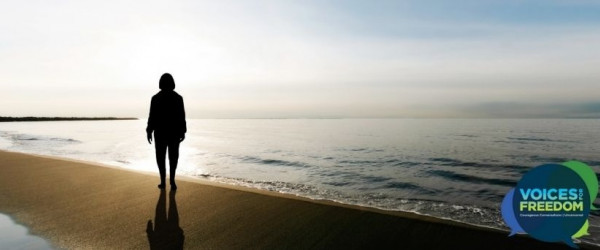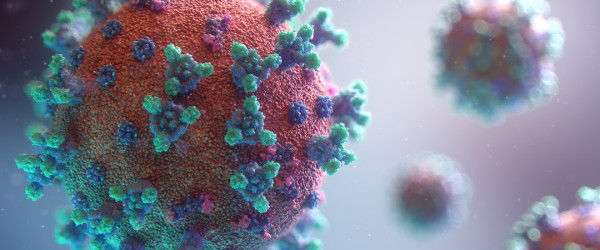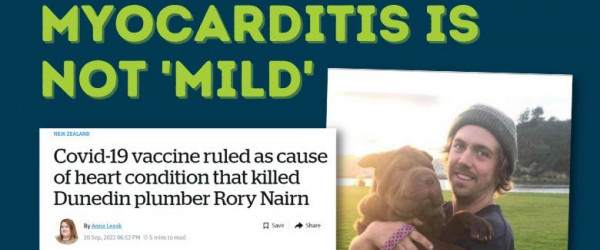
COVID-19 Vaccine Injury In NZ: Jane’s Story
Listen to Jane’s interview with Peter Williams on Magic Talk here.
Over the past month, NZ has witnessed the rollout of the new, experimental COVID-19 Comirnaty vaccine from Pfizer to border workers, frontline staff and their families.
The government and media report that there has been high uptake from within this industry and there has been no mention of ANY adverse reactions in the news. But this is not what we are hearing behind the scenes from people within the industry.
We have spoken with border workers up and down the nation and they report that many of their colleagues have made the choice to delay or decline this vaccine. In some regions, that number is close to 50%.
We have also heard about vaccine injury.
Jane* has recounted to us the distressing story of her experience with workplace coercion and of suffering an adverse reaction to the vaccine she was administered back at the beginning of March.
Here is her story…
Jane is a healthy young mother of three children. She is the breadwinner for her family and whilst she didn’t actually want to take the COVID-19 vaccine, she was left with little choice – to take the vaccine and keep her job, or decline and be unable to continue in her role within the organisation. Voices for Freedom have confirmed that this same messaging has also been communicated to border workers (in the same role) in another part of the country.
She described the speed with which the rollout took place within her workplace and how she felt ill-informed and rushed into a decision prior to the administration of her vaccine.
She tried to look up information surrounding the potential adverse reactions, as well as other reactions experienced by people in NZ and Australia but came up against brick wall after brick wall; this information, it seems, is not easily accessible to members of the public, especially if you don’t know where to look. All we get are the generalised mild reactions described in the Ministry of Health’s brief, glossy handouts. The SMARS database doesn’t yet appear to have the COVID vaccine option listed in its search criteria either, despite reactions having been lodged with CARM (the Centre for Adverse Reaction Monitoring at Otago University).
When it was Jane’s time to receive the vaccine, she was given the brief “information” pack, asked a couple of questions about previous reactions or allergies, and was required to sign the consent form. This entire process took about 5 minutes. She did not feel informed.
So, what happened to Jane?
Below is an account of the timeline of events that unfolded after Jane received her jab…
The vaccine was given on Tuesday, March 2, 2021.
3 HOURS AFTER THE SHOT Jane became really tired, had blurred reactions, and couldn’t think clearly. She drove home from work and fell asleep.
TUESDAY EVENING TO FRIDAY EVENING Jane still felt weak. She couldn’t form a fist and described having no strength. She was ON FIRE internally with burning pain in her bones and organs.
SATURDAY Jane’s body said “no more” and she needed to rest all day. A sore throat and cough began in the afternoon. She experienced fever and sweats all night long.
SUNDAY Jane couldn’t get up in the morning; her symptoms continued and she STILL had no energy or strength.
BY SUNDAY AFTERNOON She had a mild temperature, body aches, a pounding head, noise and light sensitivity, a tight chest and TROUBLE BREATHING.** She called Healthline in the early evening and explained her condition. Healthline advised she be seen immediately and they dispatched an ambulance to take her to the hospital.
When the ambulance arrived one of the ambulance officers was incredibly hostile and told her there’s “No way you’ve had a reaction to the vaccine”. The ambulance officer refused to go inside to help the patient but was reprimanded by their partner and forced to assess Jane whilst wearing full PPE.
There were discussions and phone calls within the system to decide which hospital they could take her to.
Once in the ED, the Medical Officer of Health called and spoke with Jane on the phone. He told her that he was “So sorry this has happened” to her. He also spoke with Jane’s mother and placed both houses on their property into lockdown. This interaction is in Jane’s discharge notes.
MONDAY
Jane was still experiencing body sweats, noise and light sensitivity, her organs continued to feel like they were on fire and she had a headache that made any movements difficult. She begged the doctors for pain relief. She was given medication and discharged from the hospital to recover at home.
Important note: While Jane was in the hospital another patient in the same area of the building alerted us to the fact a border worker had been admitted following a serious adverse reaction to the COVID-19 vaccine. This person witnessed Jane’s condition from an adjacent room, the staff discussing her vaccine reaction, and multiple admissions of the fact the two events appeared to be related. Voices for Freedom contacted the hospital the following morning and the Communications Manager stated that there was no such patient fitting that description in their care.
There is no record of the vaccine reaction in Jane’s hospital files.
THE FOLLOWING WEEK ONWARD
Jane continued to experience quite severe pain in her body and head. She had a persistent dead leg that came and went, which at times caused pain in her lower abdomen. She experienced insomnia from day 12 and a feeling of anxiety from day 15. Her cough and extreme fatigue persisted and only began to ease three weeks later. She continued to experience daily sweats, stomach cramps, diarrhoea, blood in her urine, and cold sores that covered her entire chin area up to her nose,** again easing at the three-week mark.
THE GP EXPERIENCE
Jane’s GP simultaneously suggested that her condition was viral, and that her adverse vaccine reaction was “good” and that it “meant her body was responding”. Jane challenged her doctor on the viral infection claim, and asked: If this was viral, how come none of the other close contact family members had caught it despite VERY close living? The doctor didn’t have an answer to her question.
Jane insisted that her GP add her vaccine reaction to her file and she self-reported her reaction to CARM as her medical centre refused to. Remember: her reaction began three hours after the administration of the vaccine and continued from that point for three weeks.
FOLLOW UP
There has been no further follow-up from the hospital or the Medical Officer of Health after Jane’s discharge from the hospital.
This afternoon (Thursday 25 March), following an interview with Peter Williams on Magic Talk yesterday morning (watch below), Jane was finally called by a doctor from CARM – two weeks after reporting her reaction.
GOING FORWARD
Jane has questions and obvious concerns:
- Why are the people we’re meant to trust (medical professionals and authorities) failing to acknowledge, or worse, hiding adverse vaccine reactions?
- Why can’t we access information surrounding these reactions in NZ like people can overseas?
- Why is nobody hearing about the stories from those who have had adverse reactions? Why is the majority of the mainstream media disinterested and silent?
- We hear about the negative health effects in COVID patients, but why not vaccine recipients?
- What happens to data collection when reactions aren’t acknowledged or reported as part of post-marketing surveillance?
It took until AFTER the vaccine for Jane to realise that:
- The Pfizer vaccine is still in trial (until 2023).
- The Pfizer vaccine doesn’t stop infection.
- There are more reactions to this vaccine than there are listed on the consent forms.
Jane has requested help from Voices for Freedom to share her experience. She hopes that by reading her story, the NZ public can make an informed decision about whether to accept or decline the COVID-19 vaccination. She isn’t telling people not to get the vaccine, rather she hopes that they educate themselves on what this product has to offer them in terms of limited personal protection as well as the potential risks and adverse reactions that are possible.
If reading this post has raised concerns for you and you feel it is a story that the NZ public should have the opportunity to hear, please share this post with the people you love, your friends, workmates, colleagues, and connections.
If you have a similar story to share (as either a consumer/patient OR medical professional), please get in touch with us via our secure email account: [email protected] Our promise to you is that ALL identities, locations, and employment details WILL be kept secret unless you instruct us otherwise.
When the government and media fail in their role to provide truth and balance in important discussions, it becomes the duty of the people of NZ to step into this void and even up the scales. Will you help us to achieve this goal?
To report an adverse reaction to the COVID-19 vaccine, please visit CARM.
Jane’s real name has been protected for safety and privacy reasons.
Thanks for reading and sharing! Remember to sign up to our mailing list to keep up with the latest news.
If you value what we are up to at Voices and would like to support our ongoing work you can donate to us and support our nationwide public education campaigns (webinars, flyers, billboards...) and other initiatives to speak up and push back for your freedoms.



